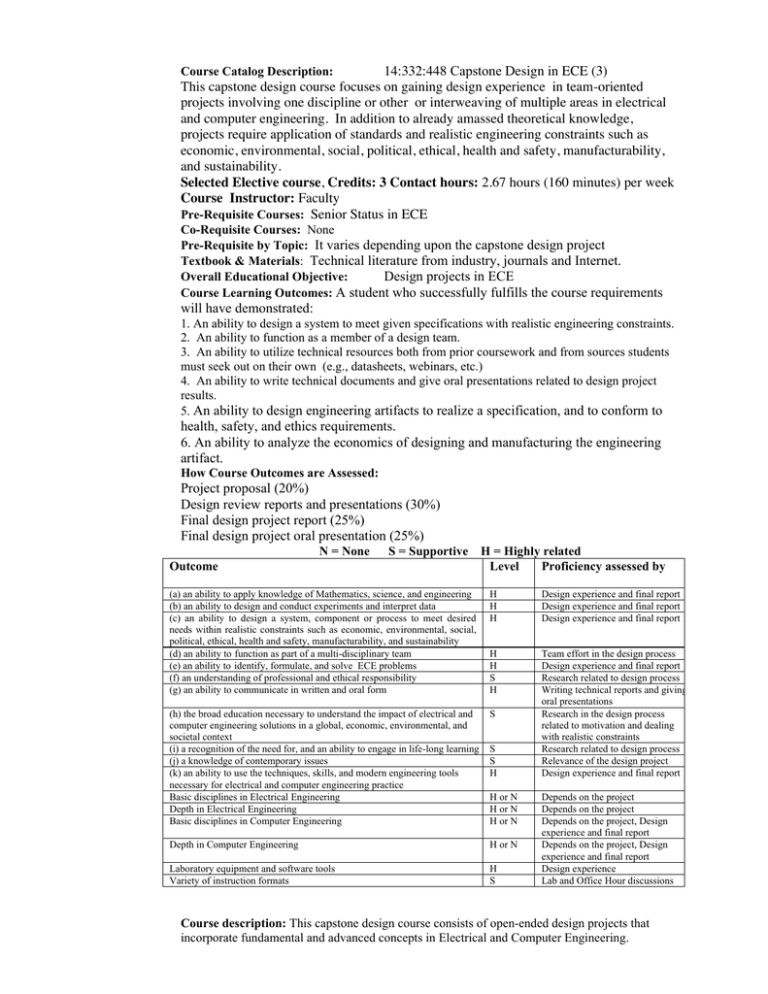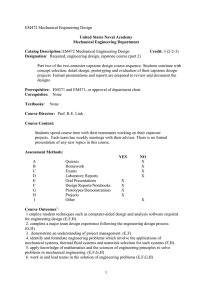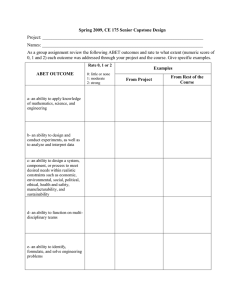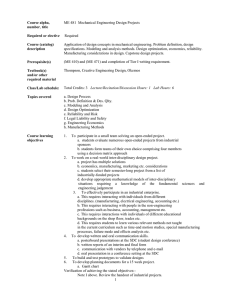14:332:448 Capstone Design in ECE (3) This capstone design
advertisement

14:332:448 Capstone Design in ECE (3) This capstone design course focuses on gaining design experience in team-oriented projects involving one discipline or other or interweaving of multiple areas in electrical and computer engineering. In addition to already amassed theoretical knowledge, projects require application of standards and realistic engineering constraints such as economic, environmental, social, political, ethical, health and safety, manufacturability, and sustainability. Selected Elective course, Credits: 3 Contact hours: 2.67 hours (160 minutes) per week Course Instructor: Faculty Pre-Requisite Courses: Senior Status in ECE Course Catalog Description: Co-Requisite Courses: None Pre-Requisite by Topic: It varies depending upon the capstone design project Textbook & Materials: Technical literature from industry, journals and Internet. Overall Educational Objective: Design projects in ECE Course Learning Outcomes: A student who successfully fulfills the course requirements will have demonstrated: 1. An ability to design a system to meet given specifications with realistic engineering constraints. 2. An ability to function as a member of a design team. 3. An ability to utilize technical resources both from prior coursework and from sources students must seek out on their own (e.g., datasheets, webinars, etc.) 4. An ability to write technical documents and give oral presentations related to design project results. 5. An ability to design engineering artifacts to realize a specification, and to conform to health, safety, and ethics requirements. 6. An ability to analyze the economics of designing and manufacturing the engineering artifact. How Course Outcomes are Assessed: Project proposal (20%) Design review reports and presentations (30%) Final design project report (25%) Final design project oral presentation (25%) N = None S = Supportive Outcome H = Highly related Level Proficiency assessed by (a) an ability to apply knowledge of Mathematics, science, and engineering (b) an ability to design and conduct experiments and interpret data (c) an ability to design a system, component or process to meet desired needs within realistic constraints such as economic, environmental, social, political, ethical, health and safety, manufacturability, and sustainability (d) an ability to function as part of a multi-disciplinary team (e) an ability to identify, formulate, and solve ECE problems (f) an understanding of professional and ethical responsibility (g) an ability to communicate in written and oral form H H H Design experience and final report Design experience and final report Design experience and final report H H S H (h) the broad education necessary to understand the impact of electrical and computer engineering solutions in a global, economic, environmental, and societal context (i) a recognition of the need for, and an ability to engage in life-long learning (j) a knowledge of contemporary issues (k) an ability to use the techniques, skills, and modern engineering tools necessary for electrical and computer engineering practice Basic disciplines in Electrical Engineering Depth in Electrical Engineering Basic disciplines in Computer Engineering S Team effort in the design process Design experience and final report Research related to design process Writing technical reports and giving oral presentations Research in the design process related to motivation and dealing with realistic constraints Research related to design process Relevance of the design project Design experience and final report Depth in Computer Engineering H or N Laboratory equipment and software tools Variety of instruction formats H S S S H H or N H or N H or N Depends on the project Depends on the project Depends on the project, Design experience and final report Depends on the project, Design experience and final report Design experience Lab and Office Hour discussions Course description: This capstone design course consists of open-ended design projects that incorporate fundamental and advanced concepts in Electrical and Computer Engineering. Measurements, simulations, and/or characterization of system performance is performed so as to demonstrate that the design objectives and specifications have been met. Design projects are accomplished through team effort with teams comprised of two to six students. The final design project reports must address issues, as appropriate, that are related to manufacturability, engineering economics, environmental, social issues, ethics, and health and safety. Each design team must prepare and deliver oral presentations describing their design process and results. The objective of this course is to provide a comprehensive capstone design experience for students in a team-oriented format that is consistent with ABET requirements. The course structure consists of weekly meetings throughout the semester with students that have been organized into design teams. Faculty participation in the design process involves mentoring and oversight in the following areas: (1) guide students as they proceed with their project designs (2) monitor the progress of project designs (3) expose students to economic, ethical, and social effects related to the design projects (4) present methods of technical writing; interact with students to improve writing skills (5) assess the quality of presentation describing the team final design project results At the conclusion of each design project the design team is required to submit a written technical report describing the details of the final design process and results, as well as highlight relevant conclusions. At the end of the semester each design team is required to prepare and deliver publicly (especially to the class as a whole) an oral presentation describing the final design project. Computer Usage: Simulations using CAD software packages. Technical reports and presentations are prepared using word processing and graphics software. Laboratory Experiences: Extensive laboratory experience might be required to achieve design project results. Design Experiences: This is a capstone design course. The entire course is devoted to the solution of an open-ended engineering design project that is to meet stated specifications. Independent Learning Experiences: 1. Extensive research to complete open-ended design as needed. 2. Formulate experiments and collect data to verify design steps. 3. Write technical reports. 4. Prepare and deliver oral presentations relating to the design process. Contribution to the Professional Component: (a) College-level mathematics and basic sciences: 0 credit hours (b) Engineering Topics (Science and/or Design): 3 credit hours (c) General Education: 0 credit hours Total credits: 3 Prepared by: P. Sannuti Date: May, 2012




